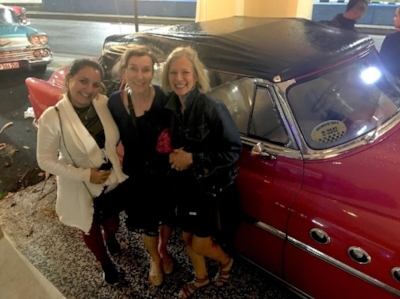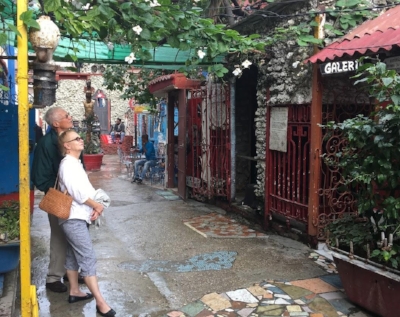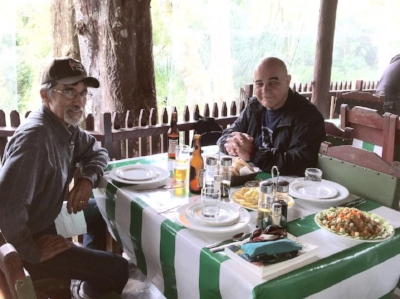Activity
-
Orrin Luc posted an articleJohn Dickson provides lessons and insights from his 25 years in foreign service. see more
History Shock
When History Collides with Foreign Relations
By John Dickson
University of Kansas Press
Reviewed by Nathalie Vadnais
John Dickson gleans insights from 25 years as a foreign service officer, much of which included hard lessons that came from not having a deeper knowledge of a host country’s history. That leads time and again to what he terms “history shock,” wherein dramatically different interpretations of history have blocked diplomatic understanding and cooperation.
Dickson served with the Peace Corps in Gabon 1976–79 before joining the U.S. Information Agency in 1984; he later served with the State Department when the two agencies merged. He uses vignettes describing personal interactions and an analysis of his experiences in Mexico, Cuba, Canada, Nigeria, South Africa, and elsewhere. “By cherry-picking those events that helped construct a nation that is exceptional,” Dickson writes, “the United States has consistently overlooked that slice of its history that does not correspond to its self-image.” And by “neglecting history, we are less able or willing to draw on memory to aid in how we learn, make decisions, behave, or develop new strategies.”
This review appears in the special 2022 Books Edition of WorldView magazine. Story updated May 22, 2022.
Nathalie Vadnais is an intern with WorldView. She is completing a degree in international studies at Virginia Commonwealth University.
- Michael Merry likes this.
-
Cooper Roberts posted an articleCuba. What comes to mind when you hear that word? see more
Cooper Roberts, RPCV Burkina Faso, Next Step Travel Team
Seize the opportunity to engage in historical and colorful conversations with the welcoming Cuban people on a licensed journey to the Caribbean’s vivacious and resilient pearl.
Cuba. What comes to mind when you hear that word? Classic cars and communism? Cigars and the embargo? Guantanamo and Buena Vista? There is perhaps no country in Latin America that evokes such polarizing images. So, this past December, a dozen intrepid explorers joined NPCA’s Next Step Travel program to better understand what it means to be Cuban in our current times. And they did it the way Peace Corps Volunteers know best: by getting on the ground, talking to locals, and exploring the heart of the issues.
They started their adventure by visiting Old Havana: the vibrant, cultural and historic center of the island. Led on a private walking tour by their local guide, one traveler shares, “I could listen to Dayana [the local guide] all day! She was full of important information, and lots of fun.” Throughout the trip, they learned from Dayana and her family, including why she left the countryside to come to Havana, how she still supports the rural village where her mother is from, and how to make traditional Cuban coffee, while visiting her home.

With the local guide, Dayana, cruising down the Melecon
The weekend also included many “amazing [meals], with something interesting in each and every place: rooftop views, old homes with classic sculptures, rum and cigars, candlelight. Each was marvelous in its own way.” At one meal, they were treated to a local treat: dinner with a former Cuban diplomat. Carol Chappell (Russia, 1992-1994), described hearing about his perceptions on the island and its people as a highlight of the trip, continuing to say, “The Next Step Travel trip to Cuba was everything we expected and more: Educational, fun, and informative. My husband and I are still telling people about this all around great trip!”

Carol and Pete exploring Callejon de Hamel
Throughout the trip, they dove into aspects of Cuban life and the Cuban economy. Visiting a cigar factory, they learned about this export and a lifeblood of the marketplace. In a ration store, the benefits and limitations of the system were, quite literally, visible on its shelves, which were dusted with flour. They visited community-based organizations and local non-profits, with leaders who were “eloquent in their descriptions of the country…. helping us to understand how Cuba works.” Their nights would be spent in a typical Cuban fashion, tasting the island’s best rums and listening to jazz and rumba -- all of which have been exported to the world.
Pauline Banducci (Philippines 1978-80) shared, "YOU MUST GO TO CUBA - LIKE RIGHT NOW!! It is a wonderful country with lovely people. I loved visiting and learning about the culture and hardships of Cuba, alongside amazing RPCVs." We hope you’ll join us in May!

Pauline’s husband, Richard, enjoying a meal with our new friend and local guide, Fidel
Join us this May by by registering here. Other destinations on the 2018 Next Step Travel calendar include an “altourism” trip to Puerto Rico in March, an “eye-popping” Silk Road adventure in September, and a journey to the “geological wonder” of Iceland in December.


